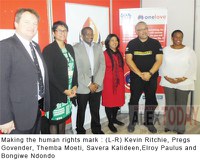
Human rights practitioners call for improved health care

“This incident will never happen in Sandton; as there is too much inequality between Alex and Sandton,” remarked Pregs Govender, Human Rights Commissioner. She said the lack of water and sanitation impacts negatively on health, housing, food, education, safety and security and human dignity. She said a holistic approach is needed to address macro-economic causes of deepening inequality that undermine human rights.
“The majority of those who do not enjoy Constitutional rights are poor. Black people in SA’s former Apartheid homelands, townships and informal settlements have the least access,” she said.
Said Kalideen of Soul City Institute said, “We have experienced significant improvements since 1994 with the establishment of free primary health care, gains in service provision and the passing of relevant legislation. But these gains are often overshadowed by the seemingly insurmountable challenges facing the health sector. “Health is an indivisible human right that is central to development. Improving health requires that we tackle the socio-economic determinants of health such as poverty, access to clean water and sanitation, and education through intersectoral collaboration,” added Dr Themba Moeti, CEO of Health Systems Trust.
Panellists concluded the need for speedy implementation of National Development Plan and National Health Insurance to address social determinants of Health.
